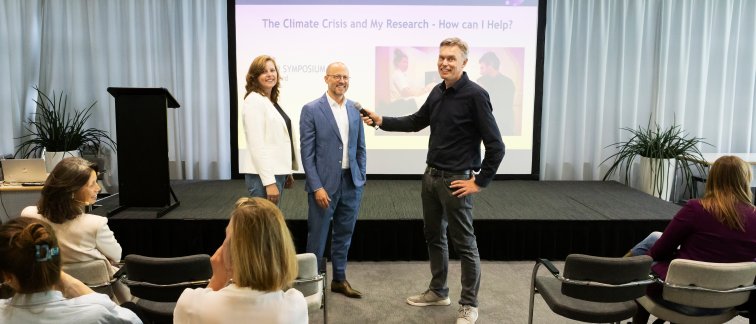Everyone agrees that healthcare must become more sustainable. However, sustainability goes beyond just recycling or reducing plastic waste. Scientific research is all about the healthcare of tomorrow. By embedding sustainability in the research that we do, we can make healthcare sustainable in a future-proof way. The Amsterdam Reproduction & Development (AR&D) research institute has embraced this philosophy and aims to promote sustainability in research. But how do you achieve this? On Thursday, May 23, AR&D held its annual symposium to address this topic.
Chairs Wouter Hehenkamp (Professor of Efficient and Sustainable Healthcare) and Berber Kapitein (Initiator of the Staff Council (‘medewerkersberaad’) for Sustainable Mobility, Emma Green Team) organized a program to show PhD students and senior researchers how to integrate sustainability into their research. Whether you are conducting epidemiological, clinical, or translational research, or working in a laboratory, there is always something that can be done to work more sustainable.
Program Overview
- The program began with Amsterdam UMC visiting professor Hugh Montgomery (program leader of the Lancet Countdown on planetary health), who compellingly demonstrated why sustainability should be a top priority for everyone.
- Anneke Kwee from the ZEGG (Care Evaluation and Appropriate Use) program discussed the possibilities and necessity of embedding appropriate care as an important form of sustainable healthcare in research.
- Aram de Haas is committed to making laboratories more sustainable, including managing the LEAF program (see UCL). An example is the Freezer Challenge, which can save up to 30 percent energy without compromising the quality of stored tissue.
- Environmental scientist Lynn Snijder explained how to measure environmental impact (CO2, or other environmental impact factors). Amsterdam UMC is taking important steps to simplify this with the 'Promeza tool' (developed in part by Lynn Snijder), but
other methods such as Material Flow Analysis or a Life-Cycle Assessment (LCA)
were also discussed. - Finally, Cristina Richie (Lecturer in Ethics at the University of Edinburgh) discussed how to view the question of healthcare limits through an ethical lens. The climate crisis is so severe and has such a concrete impact on human health that healthcare, as a significant emitter of greenhouse gases, must become more sustainable. This necessitates critically questioning whether to offer care that does not improve health and under what conditions.
Conclusion
In the panel discussion, most participants indicated that they saw ways to integrate sustainability into (part of) their research. A great way to implement this is the AR&D sustainability grant, announced during the symposium: three types of grants to make your research more sustainable.
Chairs Wouter Hehenkamp and Berber Kapitein looked back with satisfaction: "It was a successful afternoon where we inspired many researchers and provided practical tools on
how to make research sustainable. If you want to integrate sustainability into your own research institute, contact one of the chairs or the Center for Sustainable Healthcare!"
Want to know more?
- Are you interested in making your lab more sustainable? Email duurzaamheid@amsterdamumc.nl or visit the UCL website, the developer of the LEAF program.
- If you want to calculate the impact of an instrument, operation, care pathway, or transportation, you can also contact the Center for Sustainable Healthcare (duurzaamheid@amsterdamumc.nl).
Photo credits: Martijn Gijsbertsen

